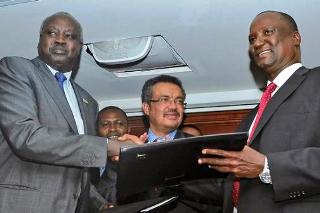Juba slams regional failure to deploy ceasefire monitors
February 7, 2014 (JUBA) – South Sudan has expressed strong disappointment with the regional block tasked with mediating of the conflict between the government and rebels opposed to president Salva Kiir for failure to deploy ceasefire monitors.

“The IGAD advance team has already arrived in Juba without official communication to the government of South Sudan from the IGAD,” Michael Makuei Lueth said in a statement broadcast on the state-owned SSTV Thursday.
“What we know is that the Joint Technical Committee (JTC) should have been formed first before IGAD could send in the monitors,” he added.
The minister said the 14-member IGAD team arrived in Juba on Sunday for meetings with state and non-state stakeholders, including local and international organisations in Juba and several locations across the country.
IGAD’s team, led by retired Major General Gebreeg Zabher Mebrahtu of Ethiopia and his deputy Major General Mohammed Amin Moustafa Eltinay of Sudan, also includes military and civilian experts drawn from IGAD member states.
The team, which held several meeting with different officials during its five-day trip to South Sudan, surveyed different areas for possible deployment of the monitoring and verification teams.
South Sudan has been shaken by violence since mid-December, when President Salva Kiir accused his former deputy Riek Machar and other political opponents of being behind a failed coup attempt against his regime.
Machar and his co-accused all deny planning a coup and accuse Kiir of using a split in the military to silence his critics.
The violence has already claimed the lives of more than 10,000 people, according to some estimates, while reports from the UN indicate that more than 820,000 people have been displaced by the conflict.
The United Nations Office for the Coordination of Humanitarian Affairs (UNOCHA) has appealed for $1.27 billion to assist about 3.2 million people in the country.
Following weeks of talks, the warring rivals signed an agreement on January 23 to end nearly six weeks of fighting, but the deal is believed to have been violated by both sides.
Talks are due to resume on Monday, but the issue of the continued presence of Ugandan troops – who have controversially fought with South Sudan’s army against the rebels – and the detention of four senior politicians who oppose Kiir’s rule are likely to hinder efforts to negotiate a lasting peace agreement.
(ST)
